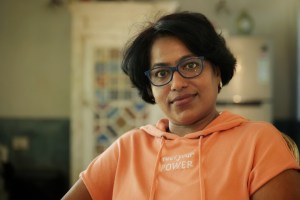CPJ is honored to present its 2023 International Press Freedom Award to Indian journalist Shahina K.K.
Shahina K.K. is a veteran Indian journalist who has worked across print and broadcast media to shed light on issues such as gender, human rights, and marginalized communities, along with the injustices they face. CPJ has been documenting the myriad ways in which she has been attacked and intimidated since at least 2010.
Shahina, currently a senior editor for Outlook magazine, was one of the first journalists in India to be charged under the Unlawful Activities (Prevention) Act, or UAPA, a draconian anti-terror law extensively weaponized against journalists in the country for over a decade.

She has continued her reporting in various posts despite awaiting trial for a case opened in 2010, when local government officials in Karnataka state sought to criminalize her reporting published in Tehelka, a prominent investigative magazine where she worked at the time. Her report cast doubt on a police investigation into 2008 bomb blasts in Bengaluru, alleging that the police had fabricated witness statements to arrest a local Muslim cleric.
She faces three charges under the penal code, including criminal intimidation, intent to commit a criminal act, and criminal conspiracy, and one count under UAPA pertaining to threatening witnesses. As of June 2023, Shahina is out on bail pending trial. If convicted, she faces a maximum of three years in prison and a fine.
A Muslim by birth, Shahina has also been subjected to extensive harassment by Indian right-wing groups seeking to silence her reporting on religious minorities and vulnerable caste groups. She has faced persistent online harassment and lewd threats, and in 2020, several right-wing publications falsely implicated her in that Bengaluru bombing.
Based in Kochi, in the southern state of Kerala, Shahina has worked as a reporter, production associate, and news anchor with well-known news outlets including Asianet News, Janayugom, Open, and The Federal. She also has contributed to The Washington Post.
By honoring Shahina with this year’s IPFA, CPJ shines a spotlight on India’s increasingly repressive environment for press freedom, with the targeting of journalists under draconian security laws, and toxic online campaigns particularly aimed at vilifying women journalists and ethnic or religious minorities.
The text of Shahina K.K.’s acceptance speech, as prepared for delivery, is below.
I am honored and humbled to receive CPJ’s International Press Freedom Award.
On this day 13 years ago, I was in the picturesque Kodagu region of South India, which is renowned for its tea, coffee, and ginger plantations. I was working for Tehelka, a news magazine, and my assignment was to cover a deadly bomb blast in Bangalore in 2008. During my investigation, I interviewed key witnesses who had testified against a Muslim cleric. To my dismay, I discovered that their testimonies were fabricated.
Tehelka published the story titled “Why is This Man Still in Prison?” but instead of acting to address the flaws exposed by my reporting, the local state police turned against me. I’ve been entangled in this legal battle ever since. I am currently out on bail pending trial.
As time went on, I made a conscious effort to derive more from my courtroom experiences. I met many people who had unusual encounters with the legal system, with a significant number of them being victims of fabricated cases.
This resulted in a series of articles that illuminated the challenges endured by the marginalized population in the state of Karnataka. As I sought to understand legal abuses, I also pursued a law degree, ultimately earning it in 2016.
It’s no coincidence that I stand here today holding CPJ’s award. When I was charged, I was one of the first journalists to face the oppressive anti-terror Unlawful Activities Prevention Act. But today, 15 journalists across India bear the weight of this act, with some in jail and others out on bail. Journalism has always been my primary passion, driven by a deep desire to understand how politics and power impact people’s lives. Twenty-six years ago, I embarked on my career as a television journalist in Singapore, at a time when private broadcasting was not permitted in India. Today, my determination to be in the field led me to explore diverse regions of India, shedding light on the struggles of the underprivileged against the prevailing power structures.
I extend my heartfelt gratitude to CPJ for standing by me since the moment my legal ordeal began. I want to recognize Kunal, CPJ’s India representative. Your considerate support has meant a lot to me, and I thank you for it.
I also want to express my profound appreciation to my friends and family, who have unwaveringly supported me through the most trying period of my life. I can’t forget to mention my partner Rajeev and my son Anpu. Their lives have been turned upside down due to this case.
Anpu -who is here tonight- was a tiny four-year-old when the case was slapped on me. We had to go on the run, to dodge arrest while we waited for bail. It really hit him the hardest. He had to say goodbye to his little buddies and the cool schooling we’d dreamt of for him. After November 2010, our lives took a sharp turn for the worst, and we’re still in the thick of this battle, far from seeing the end.
I dedicate this award to all my fellow journalists in India who are targeted for their work and journalism. Thank you all.